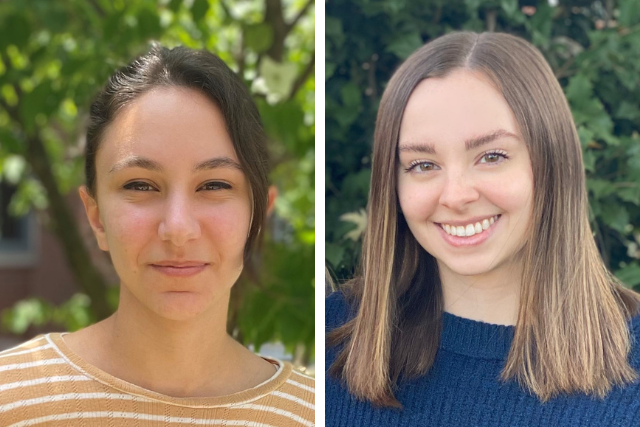The National Science Foundation Graduate Research Fellowship Program is one of the most competitive sources of support for students in STEM fields, with the vast majority of recipients being first- and second-year graduate students. But this year, two TCNJ seniors earned recognition on the sought-after list of honorees.
Chemistry major Alexis Luglio won a fellowship in materials research, and mathematics major Eileen Yizzi received an honorable mention in mathematical biology.

Luglio’s five-year fellowship includes three years of financial support, including an annual stipend of $34,000 and a cost of education allowance of $12,000 to the institution. She’ll head to the University of Michigan to pursue a PhD in materials science and engineering.
“I hope to research and help develop new battery systems that will better meet the energy demands of our growing population,” she said.
Luglio was one of only 2,552 awards given in 2023 out of more than 12,000 applications.
Yizzi was also one of the few selected — one of just 800 honorable mentions. She will study applied mathematics and statistics at Johns Hopkins University. While she won’t receive financial support, “having this experience of writing a research proposal and receiving good feedback prepares me well for potentially writing research proposals in grad school,” she said.
Both students were involved in research projects with faculty mentors at TCNJ. Luglio worked with chemistry professor Abby O’Connor to synthesize catalysts using organic techniques and analyze their electrochemical properties. She also held summer research internships at Syracuse University in New York and the National Renewable Energy Laboratory in Golden, Colorado.
Yizzi worked on mathematical biology research under the supervision of Nicholas Battista. Her project focused on modeling the kinematics (i.e. motion) of a lion’s mane jellyfish and analyzing how its swimming performance changes from varying its shape.
The NSF Graduate Research Fellowship Program recognizes and supports outstanding graduate students in NSF-supported science, technology, engineering, and mathematics disciplines who are pursuing research-based master’s and doctoral degrees at accredited United States institutions.
As the oldest graduate fellowship of its kind, the GRFP has a long history of selecting recipients who achieve high levels of success in their future academic and professional careers.
— Emily W. Dodd ’03
